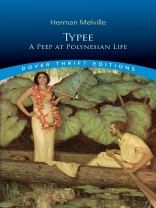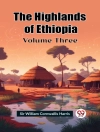In this classic of travel and adventure literature, Herman Melville drew upon his adventures in the South Pacific Marquesas Islands as a prisoner of the Typee people. Like the novel’s narrator, Melville jumped ship from a whaling vessel and was held in benign captivity by an indigenous tribe with a reputation for ferocity and cannibalism. His startling and romantic glimpses of native peoples and their customs thrilled Victorian readers, making this the most popular of Melville’s books in its day.
The study of a culture that both impressed and alarmed the author, this 1846 narrative is also the exciting story of a stranded sailor’s attempts to escape from an idyllic but ultimately stultifying existence. Melville’s book enjoyed a reputation as a reliable source of firsthand anthropological lore for decades before his use of poetic license came to light. Nevertheless, modern readers appreciate the tale as an intriguing mix of experience and imagination, a combination that enlivened and informed Melville’s other works.
Table des matières
CHAPTER I
The Sea Longings for Shore A Land-sick Ship Destination of the Voyagers The Marquesas Adventure of a Missionary’s Wife among the Savages Characteristic Anecdote of the Queen of Nukuheva
CHAPTER II.
Passage from the Cruising Ground to the Marquesas Sleepy Times aboard Ship South Sea Scenery Land ho ! The French Squadron discovered at anchor in the Bay of Nukuheva Strange Pilot Escort of Canoes A Flotilla of Cocoa-nuts Swimming
Visitors. The Dolly boarded by them State of Affairs that ensue
CHAPTER III.
Some Account of the Late Operations of the French at the Marquesas Prudent Conduct of the Admiral Sensation produced by the Arrival of the Strangers The First Horse seen by the Islanders Reflections Miserable Subterfuge of the French Digression
concerning Tahiti Seizure of the Island by the Admiral Spirited Conduct of an English Lady 21
CHAPTER IV.
State of Affairs aboard the Ship Contents of her Larder Length of South Seamen’s Voyages Account of a Flying Whale-man Determination to leave the Vessel The Bay of Nukuheva The Typees Invasion of their Valley by Porter Reflections Glen of Tior Interview between the Old King and the French Admiral
CHAPTER V.
Thoughts previous to attempting an Escape Toby, a Fellow Sailor, agrees to share the Adventure Last Night aboard the Ship .
CHAPTER VI.
A Specimen of Nautical Oratory Criticism of the Sailors The Starboard Watch are given a Holiday The Escape to the Mountains
CHAPTER VII.
The other side of the Mountain Disappointment Inventory of Articles brought from the Ship Division of the Stock of Bread Appearance of the Interior of the Island A Discovery A Ravine and Waterfalls A sleepless Night Further Discoveries My Illness A Marquesan Landscape
CHAPTER VIII.
The Important Question, Typee or Happar? A Wild-Goose Chase My Sufferings Disheartening Situation A Night in a Ravine Morning Meal Happy Idea of Toby Journey towards the Valley
CHAPTER IX.
Perilous Passage of the Ravine Descent into the Valley
CHAPTER X.
The Head of the Valley Cautious Advance A Path Fruit Discovery of Two of the Natives Their Singular Conduct Approach towards the Inhabited Parts of the Vale Sensation produced by our Appearance Reception at the House of one of the Natives
CHAPTER XI.
Midnight Reflections Morning Visitors A Warrior in Costume A Savage AEsculapius Practice of the Healing Art Body Servant A Dwelling-house of the Valley described Portraits of its Inmates
CHAPTER XII.
Officiousness of Kory-Kory His Devotion A Bath in the Stream Want of Refinement of the Typee Damsels Stroll with Mehevi ATypee Highway The Taboo Groves The Hoolah Hoolah Ground The Ti Time-worn Savages Hospitality of Mehevi Midnight Misgivings Adventure in the Dark Distinguished Honours paid to the Visitors Strange Procession and Return to the House of Marheyo
CHAPTER XIII.
Attempt to procure Relief from Nukuheva Perilous Adventure of Toby in the Happar Mountain Eloquence of Kory-Kory .
CHAPTER XIV.
A great Event happens in the Valley The Island Telegraph Something befalls Toby Fayaway displays a tender Heart Melancholy Reflections Mysterious Conduct of the Islanders Devotion of Kory-Kory A rural Couch A Luxury Kory-Kory strikes a
Light el la Typee
CHAPTER XV.
Kindness of Marheyo and the rest of the Islanders A full Description of the Bread-fruit Tree Different Modes of preparing the Fruit
CHAPTER XVI.
Melancholy Condition Occurrence at the Ti Anecdote of Marheyo Shaving the Head of a Warrior
CHAPTER XVII.
Improvement in Health and Spirits Felicity of the Typees Their Enjoyments compared with those of more enlightened Communities Comparative Wickedness of civilised and unenlightened People A Skirmish in the Mountain with the Warriors of Happar
CHAPTER XVIII.
Swimming in company with the Girls of the Valley A Canoe Effects of the Taboo A pleasure Excursion on the Pond Beautiful Freak of Fayaway Mantua-making A Stranger arrives in the Valley His mysterious conduct Native Oratory The Interview
Its Results Departure of the Stranger
CHAPTER XIX.
Reflections after Marnoo’s Departure Battle of the Pop-guns Strange Conceit of Marheyo Process of making Tappa .
CHAPTER XX.
History of a Day as usually spent in the Typee Valley Dances of the Marquesan Girls
CHAPTER XXI.
The Spring of Arva Wai Remarkable Monumental Remains Some Ideas with regard to the History of Pi-pis found in the Valley
CHAPTER XXII.
Preparations for a Grand Festival in the Valley Strange Doings in the Taboo Groves Monument of Calabashes Gala Costume of the Typee Damsels Departure for the Festival
CHAPTER XXIII.
The Feast of Calabashes
CHAPTER XXIV.
Ideas suggested by the Feast of Calabashes Inaccuracy of certain published Accounts of the Islands A Reason Neglected State of Heathenism in the Valley Effigy of a dead Warrior A singular Superstition The Priest Kolory and the God Moa Artua
Amazing Religious Observance A dilapidated Shrine Kory-Kory and the Idol An Inference
CHAPTER XXV.
Gieneral Information gathered at the Festival Personal Beauty of the Typees Their Superiority over the Inhabitants of the other Islands Diversity of Complexion A vegetable Cosmetic and Ointment Testimony of Voyagers to the uncommon Beauty of
the Marquesans Few Evidences of Intercourse with civilised Beings Dilapidated Musket Primitive Simplicity of Government Regal Dignity of Mehevi
CHAPTER XXVI.
King Mehevi Allusion to his Hawaiian Majesty Conduct of Marheyo and Mehevi in certain Delicate Matters Peculiar System of Marriage Number of Population Uniformity Embalming Places of Sepulchre Funeral Obsequies at Nukuheva Number
of Inhabitants in Typee Location of the Dwellings Happiness enjoyed in the Valley A Warning Some Ideas with regard to the Civilisation of the Islands Reference to the Present State of the Hawaiians Fashionable Equipages at Oahu Reflections
CHAPTER XXVII.
The Social Conditions and general Character of the Typees .
CHAPTER XXVIII.
Fishing Parties Mode of distributing the Fish Midnight Banquet Timekeeping Tapers Unceremonious style of eating the Fish
CHAPTER XXIX.
Natural History of the Valley Golden Lizards Tameness of the Birds Mosquitos Flies Dogs A solitary Cat The Climate The Cocoa-nut Tree Singular modes of climbing it An agile young Chief Fearlessness of the Children Too-Too and the Cocoa-nut Tree The Birds of the Valley
CHAPTER XXX.
A Professor of the Fine Arts His Persecutions Something about Tatt QQin M:d Tabooing Two Anecdotes in illustration of the latter A few thoughts on the Typee Dialect
CHAPTER XXXI.
Strange Custom of the Islanders Their Chanting, and the Peculiarity of their Voice Rapture of the King at first hearing a Song A New Dignity conferred on the Author Musical Instruments in the Valley Admiration of the Savages at beholding a Pugilistic
Performance Swimming Infant Beautiful Tresses of the Girls Ointment for the Hair .
CHAPTER XXXII.
Apprehensions of Evil Frightful Discovery Some Remarks on Cannibalism Second Battle with the Happars Savage Spectacle Mysterious Feast Subsequent Disclosures
CHAPTER XXXIII.
The Stranger again arrives in the Valley Singular Interview with him Attempt to Escape Failure Melancholy Situation Sympathy of Marheyo
CHAPTER XXXIV.
The Escape
THE STORY OF TOBY
A propos de l’auteur
Herman Melville (1819–91) found early success with stories inspired by his adventures in the South Seas. His fortunes declined with the 1851 publication of
Moby-Dick, now recognized as a masterpiece but scorned by Melville’s contemporaries. The author was obliged to work as a New York City customs inspector and died in obscurity, three decades before the critical reassessment of his work.












